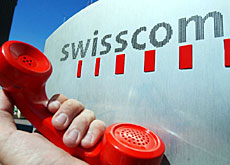
Swisscom confirms talks with government

Swisscom has confirmed it is in talks with ministers over plans to sell off the government's majority stake in the former state-owned firm.
But European telecoms analyst Elie Cohen believes the company faces disaster unless an emphatic decision on full privatisation is taken soon.
Swisscom’s announcement comes after Swiss Communications Minister Moritz Leuenberger revealed that the decision to privatise Swisscom was only taken after hefty debate in cabinet.
On Wednesday Swisscom ended days of speculation about the state of negotiations between company management and the government, which currently owns a 66 per cent stake in the firm.
In a statement, Swisscom confirmed that it had “held intense discussions on the instructions issued by the… Swiss Confederation, has analysed the situation in detail and instigated talks with representatives from the federal government”.
The company said it would not be issuing any information about “what action it intends to take” until next week “at the earliest”.
Also on Wednesday the Senate decided to hold an urgent debate – on December 15 – on the government’s strategy regarding Swisscom.
Leuenberger said he stood behind the government decision to sell off its stake and confirmed that the cabinet had instructed its representative on the company board to block any foreign acquisitions by Swisscom.
But he said the question of what constituted a foreign acquisition was open to interpretation and needed to be clarified.
Facing disaster
Cohen, an economist at the French Centre for Scientific Research and author of a book on telecoms privatisation, said Switzerland must avoid the mistakes made by the French and German governments.
He said Paris and Berlin had retained stakes in former state-owned telecommunications firms and allowed bad deals to build crippling debts.
He urged the Swiss government to sell up or take over Swisscom completely.
“The French state sold its majority interest in France Telecom, but still held a stake – which was a mistake,” Cohen said. “The next five-year period was the worst in the company’s history.
“It lost billions of euros by buying interests in other countries which went wrong. The state did not intervene and the situation represented the worst of both worlds.”
Cohen said Deutsche Telekom was in a similar position and the board made decisions without due process because nobody was in charge.
“The best situation is if the state holds a 100 per cent interest or the company is completely privatised,” he said.
Veto
On Tuesday Interior Minister Pascal Couchepin reiterated the government’s recommendation of a veto on any future foreign acquisitions by Swisscom until the privatisation issue is resolved.
In a series of newspaper interviews, he said the government had recommended that the company abandon plans to buy Irish telecoms firm Eircom.
Over the weekend Justice Minister Christoph Blocher raised fears that Swisscom could make the same mistakes as former national airline Swissair, which was brought to its knees following a series of bad buys, including Belgium’s Sabena airline.
Some SFr1.5 billion ($1.15 billion) has been wiped off Swisscom’s share value since the government announced last week that it intends to sell its stake in the company.
“If the Swiss government considers Swisscom to be a key asset for Switzerland and wants to protect it from falling into foreign hands, then it should stay a majority shareholder,” said Cohen.
“But if it considers competition to be healthy for the telecoms industry, then it should privatise and at the same time have a strong regulatory body while Swisscom is still dominant.”
Synergies
Cohen believes that telecoms companies will have to adapt to keep up with the changing market that has embraced mobile telephones, information technology (IT) and broadband internet services in recent years.
“The traditional market is changing dramatically and companies are having to constantly change their strategies in these turbulent conditions,” he said.
Cohen added that businesses must be active to secure a strong position both at home and on the international market. “One way to keep ahead of the opposition is to make good acquisitions and form synergies,” he said.
“Swisscom has large amounts of money in the bank, but it has to decide what to do with it. The next three years will be crucial.”
swissinfo, Matthew Allen with agencies
The state currently holds a 66 per cent stake in Swisscom.
Germany now holds 37 per cent of Deutsche Telekom while the French government has a 33 per cent stake in France Telecom.
Swisscom lost its monopoly of the Swiss telecoms market eight years ago.

In compliance with the JTI standards
More: SWI swissinfo.ch certified by the Journalism Trust Initiative



























You can find an overview of ongoing debates with our journalists here . Please join us!
If you want to start a conversation about a topic raised in this article or want to report factual errors, email us at english@swissinfo.ch.